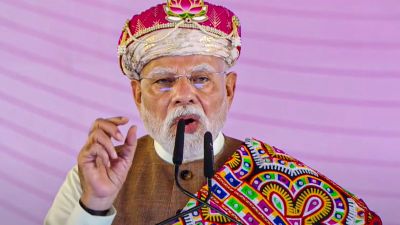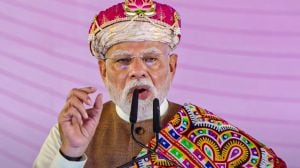At point of no return, Britain reconciles
The drums of war are getting louder and louder in Britain, all but overwhelming the conscience call of a nation deeply divided by the immine...

The drums of war are getting louder and louder in Britain, all but overwhelming the conscience call of a nation deeply divided by the imminent war over Iraq.
Television images of US President George W. Bush from Washington, looking quite gladiatorial as he announced a 48-hour deadline for Saddam Hussein and his sons, seem to have decided it for the English.
Despite the full-page anti-war advertisements, the sit-ins outside 10, Downing Street, the promise of a big demonstration on Saturday — to coincide with the possible invasion of Iraq — Britain knows deep down that all the sound and diplomatic fury of the last few months and weeks has already begun to signify nothing.
‘‘There’s no alternative left, now.’’ It’s a phrase you hear all across London, as much a cathartic release after the resignation of former foreign secretary Robin Cook yesterday protesting Britain’s participation in a war with neither ‘‘international agreement nor domestic support’’ — it didn’t set the Thames on fire — as with the refusal today of International Development Secretary Clare Short to resign.
Short’s preference for politics instead of high moral ground may have, ironically, helped save the day for British PM Tony Blair. The man with the Midas touch has been made to bleed so badly by his own party over the last few days that the possibility of his ineffable charm suffering permanent damage is not being ruled out.
By all accounts the impact of this crisis on Blair’s Labour party will be enormous. Labour backbenchers are furious that Blair prefers riding off into the sunset with his trans-Atlantic partner George Bush, rather than focussing on bread-and-butter issues at home. However the war debate in Parliament turns out two British ministers, Health minister Lord Hunt and John Denham, have resigned.
Certainly, this is Blair’s last stand. ‘‘If I were to withdraw the troops without firing a shot, imagine who would be weeping and who would be celebrating,’’ he told Parliament today, defending his government’s decision.
But for the first time the same people who have delighted in savaging Blair, today, admitted that public opinion had begun to dramatically shift ‘‘towards’’ military action.
A Guardian poll pointed out that the anti-war lead had narrowed from 23 to only 6 points in the last month. Simultaneously, there was a recovery in the rating of the much-besieged Blair, with 45 points. 70 per cent of Labour voters felt he continues to do a fine job.
Whether or not Blair will survive, London certainly seems transfixed by its current crisis. From taxi drivers to Foreign Office honchos to cultural czars, talk of the war and Britain’s role in it seems to have frozen the nation either into garrulous dismay or breathless silence.
England’s dilemma, which broke with UN when it went to war against Argentina over the Falklands 21 years ago in 1982, seems enhanced because the nation knows that Tony Blair has put himself out on a limb: going to war will mean a definite loss of lives, not going to war will mean a loss of face.
Many, though, don’t doubt his conviction. Whether or not Blair is going to lead his country into a war fact is there’s a grudging acceptance that he’s doing this truly because he believes that Saddam Hussein has lied to the world so long that he now needs to be punished. And that — perhaps — there’s a slim chance that after the war, Britain will one day rule the waves alongside Pax Americana.
Photos


- 01
- 02
- 03
- 04
- 05





























